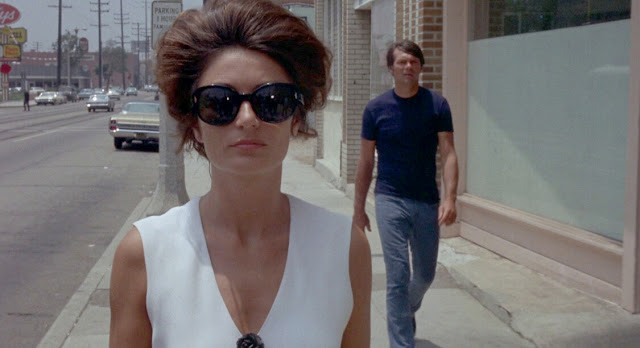Model Shop
George Matthews is a classic disaffected youth, wary of working for The Man and already jaded in his attempts at relationships. He did the "right thing" by going to college and becoming an architect. But today he wanders Los Angeles, flat broke because he did not want to contribute the mediocrity of society by building shopping centers. He has to troll his friends for the $100 he owes the finance company or his car will be repossessed. So desperate is he that he tries to bum it off someone he already owes $50.
George is also living in fear of being drafted for the Vietnam War. Perhaps this threat colors his inactivity. Makes pursuits seem pointless if he's going to be shipped overseas to get killed anyway.
But soon after we meet George (Gary Lockwood), he happens upon a beautiful, mysterious older woman in a parking lot. He's intrigued enough to follow her around town, eventually discovering her occupation - posing for photographs in a "model shop", a low rent studio in which clients can have the models pose in skimpy outfits on beds and the like as the shutter falls. He becomes an eager customer, but Lola (Anouk Aimee) is not interested in having a discussion, even though she is aware he's been following her. Poor George even spent some of the hundred bucks he borrowed from his rock star buddy on the damned session.
1969's MODEL SHOP is at once a very simple and infinitely complex motion picture. Director Jacques Demy works some sort of spell on viewers with his sharply observed travelogue of late '60s L.A. Surely Tarantino was influenced. Not obnoxious psychedelia, but rather a somber and clear eyed gape at frustration with the status quo. The malcontents and protesters offer little consolation. Gradually the film cresecendos to perhaps an inevitable finish, a place George is little surprised to find himself.. Along the way, even though we might not much like him, we feel his ennui and apathy, which may be remedied by the exotic Frenchwoman. He decides he loves her. Is it just the idea of her? What she represents? Because her life and experiences are so foreign and opposite of his?
Late in the film George and Lola, after another session at the model shop, share a drink and extensive conversation at her apartment. Both characters are tired and defeated, but their dreams shine through. Demy's script (with participation by Carole Eastman) has some poetry in their dialogue, and to me it never sounded phony. Their words are portals through which the entire movie can be viewed. As basic or as multifaceted as you would like. This may be one of the best "youth films" of its era. Refreshingly, not seen through the eyes of some one dimensional hippie, but a more thoughtful soul whose desires for more than the typical Life Path may well relegate him to some very lonely places, indeed.




Comments